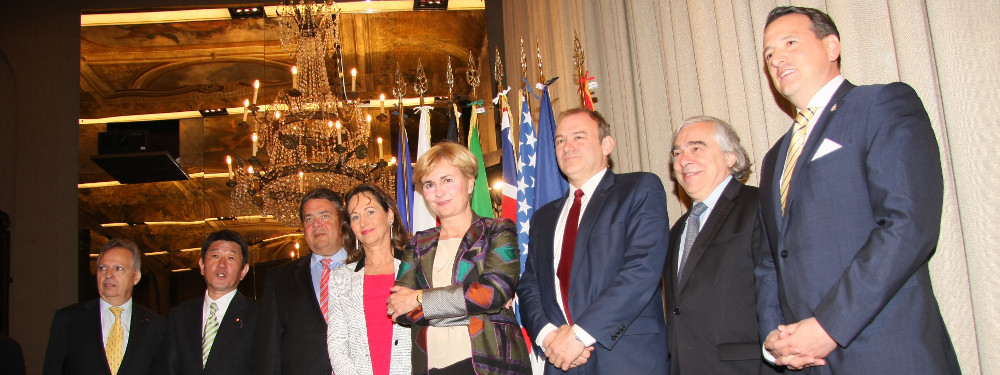Roma, 6 May 2014 – Strengthening a common energy policy on a worldwide scale in order to ensure a diversified, reliable and economically sustainable energy supply. This was the goal of the summit of G7 Energy Ministers, taking place yesterday and today in Rome, in which have also taken part the European Commissioner for Energy and the Executive Director of the International Energy Agency.
The conclusions of the summit, chaired by the Minister of Economic Development, Federica Guidi, will be submitted to the oncoming Summit of Heads of State and Government, next June in Brussels.
Discussions began last night and continued this morning, in the presence of the Heads of Delegation of the seven Countries: the French Minister of Ecology, Sustainable Development and Energy, Ségolène Royal; the German Federal Minister of Economic Affairs and Energy, Sigmar Gabriel; the British Secretary of State for Energy and Climate Change, Edward Davey; the US Secretary for Energy, Ernest Moniz; the Japanese Minister of Economy, Trade and Industry, Toshimitsu Motegu; the Canadian Minister of Natural Resources, Greg Rickford. Also the EU Commissioner for Energy, Günther Oettinger and the Executive Director of IEA, Maria van der Hoeven. The Italian Prime Minister Matteo Renzi welcomed all on the behalf of the Italian Government and wished fruitful results.
“At the core of the agenda is collective energy security and the necessary actions to ensure it – underlined Federica Guidi in the course of the final press conference. – The first part of the debate analysed the strategies to reduce energy dependency and its related risks, and saw the seven ministers agreeing on the need to support diversification of primary sources and of energy production and dispatching technologies, on the commitment for energy efficiency and for a wider use of sources alternative to hydrocarbons (i.e. renewable, nuclear, alternative fuels).
“Development and modernisation of infrastructure – carried on the Minister of Economic Development – was the theme of the second part of the discussions, highlighting the need for more powerful and more integrated energy networks, capable to ensure supplies even in the case of energy shocks. This means more interconnections between countries, development of new plants to produce, receive and dispatch Liquefied Natural Gas, widespread availability of smart grids and of efficient storage systems for electricity and gas”.
“The last theme addressed, again with a view to ensuring energy security, - concluded Minister Guidi – was how to harmonise policies and the regulatory frameworks regarding raw materials markets, the mechanisms of energy and CO2 price formation, the defence of competition, free access to markets and infrastructures and, finally, coherent systems of stimulus for renewable sources and energy efficiency.”
The Summit’s conclusions will be submitted to the oncoming G7 next June in Brussels, also with the aim of contributing to the discussion on climate change that will take place at the 2015 Paris Conference.
Joint Statement (pdf, 146 kb)
